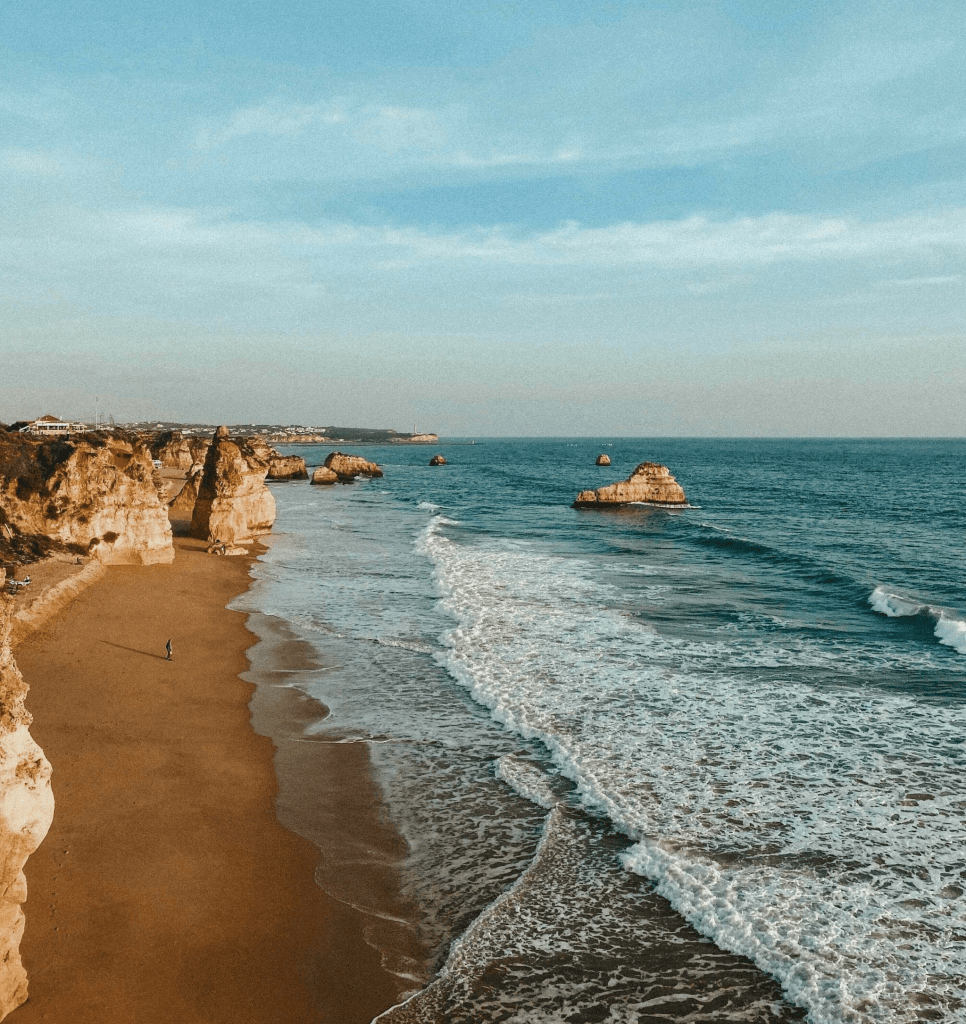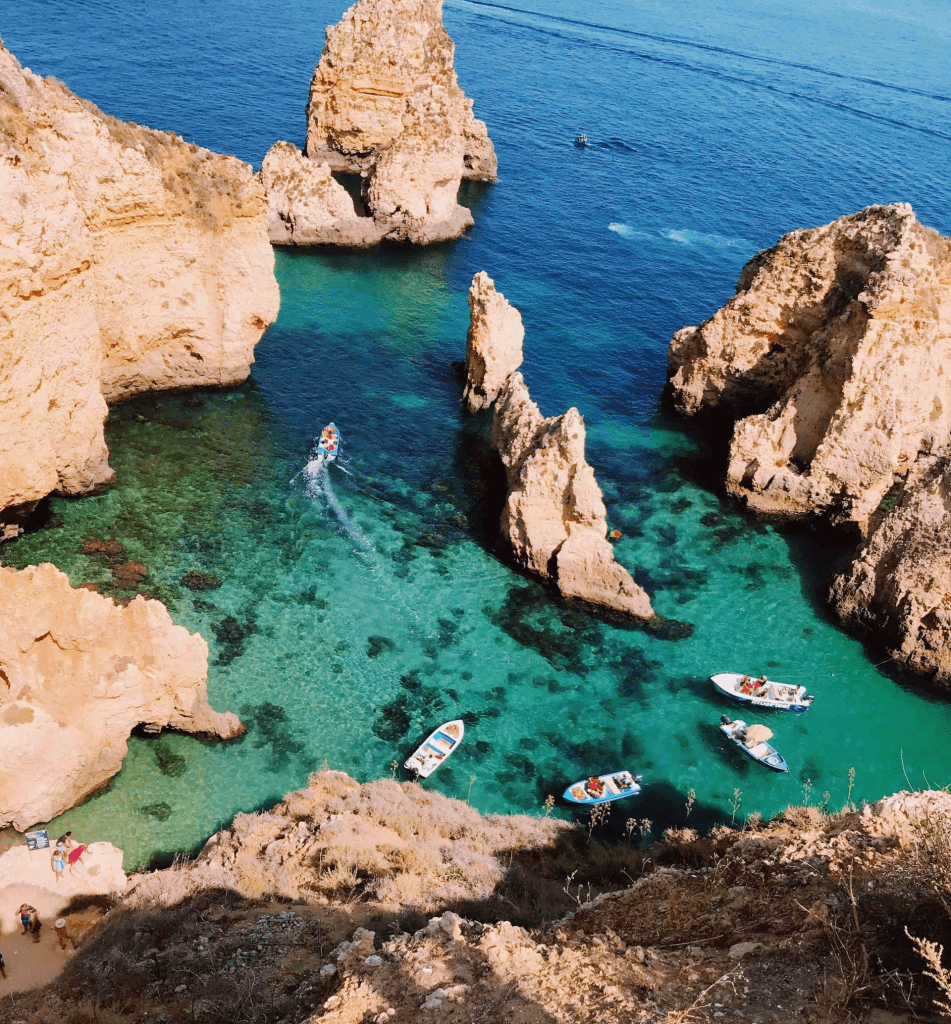Portugal D7 Visa
If you’re looking to retire or emigrate to Portugal without relying on a salaried income, you may be eligible for a Portuguese D7 visa.
For more information about the D7 visa, including how to be eligible for it, the long-term benefits, or any other question regarding moving to Portugal, get in touch with one of our immigration advisers on +44 (0)333 305 9375, or contact us online.
Read our 1001 reviews
Request a call back from our immigration experts
Benefits of Choosing IAS‘ Portugal Immigration Lawyers
When it comes to obtaining a Portugal visa or permit, IAS Portugal immigration lawyers are well-equipped to help you.
With IAS’ track record of successfully helping clients visit or immigrate to Ireland successfully, we can help you achieve your goal.
Our dedicated immigration lawyers provide our services through a comprehensive and personalised approach. With IAS, you enjoy:

Compassionate support from an experienced immigration lawyer dedicated to your success



Support in gathering supporting documents and completing a high-quality application.



Confidence that your case is being handled by an experienced team.



In-house document checks done by lawyers who are well-versed in Portugal immigration matters.
Services we Provide
Overview of the D7 Visa
The Portugal D7 visa, also known as the Portugal Passive Income visa or Retirement visa, is a route to Portuguese permanent residency aimed at non-EU/EEA citizens who do not need to rely on an active, salaried income.
The D7 visa was introduced by the Portuguese government in 2007. Similarly to the Portuguese Golden Visa, it was launched in an effort to boost the local economy of Portugal by attracting foreign nationals to come and settle in Portugal.
There are a range of benefits to the D7 visa, one of which is free, visa-free travel to much of Europe that all Portuguese permanent residents can take advantage of.
In addition, the D7 visa allows eligible visa holders to apply for Portuguese citizenship and a Portuguese passport after 5 years, which opens up further visa-free travel opportunities across the globe.
You must meet a range of eligibility criteria, including minimum financial, residency and criminal record requirements in order to be eligible for the D7 visa.


What Are the Eligibility Criteria?
The D7 visa is a popular choice for many immigrants wanting to move to a European country, partly because of its relatively lenient and minimal eligibility requirements.
To be eligible for the D7 visa, you must:
- Be aged 18 or over
- Be a non EU/EEA national
- Meet the minimum passive income requirements
- Be willing to meet the minimum residency requirement whilst in Portugal
- Have a clean criminal record
- Have a Portuguese NIF (Número de Identificação Fiscal) number
- Have a Portuguese bank account
- Be willing to become a tax resident in Portugal
You must provide a range of documents as part of the application process to prove to the Portuguese Immigration and Border Services (Serviço de Estrangeiros e Fronteiras, or SEF) that you meet the requirements.
This includes proving that you meet the minimum passive income requirements, which will vary depending on how many family members you’ll want to bring with you to Portugal.
Let our team of legal experts help you with this process. Speak to us now by calling: +44 (0)333 305 9375, or contact us online.
What Are the Minimum Passive Income Requirements?
Overview of Income Requirements
The most important aspect of establishing your eligibility for the D7 visa is proving that you meet the passive income requirements.
This will serve as proof that you’re able to sustain yourself financially throughout your stay in Portugal independently and without having to rely on a conventional salaried income.
Note that as you must be financially stable throughout all of your permanent residency period, it’s advisable to ensure that you exceed the minimum financial requirements. This will also ensure that you increase your chances of being approved for the visa, as SEF may refuse your application if they’re not fully convinced of your financial stability.
The following are considered to be eligible forms of passive income for the Portugal D7 visa scheme:
- Pensions
- Real estate
- Transferable equity
- Royalties
- Intellectual property
- Earnings from long term, fixed-rate financial investment
- Business dividends, as long as you don’t work for the company
- Interest from savings
What Are the Minimum Income Requirements?
If you’re a single applicant who won’t be bringing any family members with you to Portugal, you will need to demonstrate that you have a passive income of at least €705 per month, or €8,460 per annum.
If you’re applying with your spouse or de facto partner, you will need to demonstrate that you have an additional 50% of the original requirement to account for the additional person. This amounts to an extra €352.5 per month, or an extra €4,230 per annum. This is a total of €12,690 per annum.
For dependent children, you will need an additional 30% of the original requirement for each child you bring. This equates to €211.5 per month, or €2,568 per annum.
You will also have the ability to apply for dependent resident status if you wish to bring any parents who are financially dependent on you to Portugal. Note that you will only be able to do this once you have moved to Portugal and settled there.
It’s essential to ensure that you meet all of the eligibility criteria for the D7 visa when applying, particularly the ones pertaining to income.
If you need additional assistance with your D7 visa application, or with any other issue regarding your move to Portugal, IAS can help.
Reach out to one of our immigration advisers today on +44 (0)333 305 9375 to arrange a one-to-one advice session.
What Can I Use to Show I Meet the Minimum Passive Income Requirements?
It’s essential that you satisfy the Portuguese authorities that you meet the minimum passive income requirements for the D7 visa.
You can do this by presenting a variety of different documents and forms of proof to demonstrate your financial stability and strength of assets. For instance, you may submit any of the following:
- Bank statements from the past 3 months, with details such as the name and address of the account owner clearly visible
- Applicants with joint accounts may both use the same account statements, with both applicants each having a statement under your name or both names appearing on the statement
- Traveller’s checks
- Proof of cash funds
- Letter of employment demonstrating passive income
- International credit card demonstrating credit limit
- Investment statements
- Proof of income from property, non-property assets or intellectual property
- A company pension certificate, pension check statement or notarised letter confirming a pension from the relevant authorities
- A social security benefits letter
- Tax returns from the previous fiscal year or proof of previous economic activity and income from the previous fiscal year (if self-employed)
You will be required to submit original documents instead of copies for them to be taken as valid proof of your funds.
It may be preferable to present proof of a combination of income sources to bolster the credibility and strength of your D7 visa application.
What Are the Minimum Residency Requirements?
Whilst in Portugal on your D7 visa, you must stay within Portugal for a certain amount of time in order to maintain your resident status.
For your initial resident permit, you must spend at least 16 months in Portugal per every 2 year period. This means that you cannot spend more than 6 months outside of Portugal for every 2 year period.
For each subsequent residency permit, you must spend at least 30 months in Portugal per every 3 year period. Similar to above, this means that you cannot spend more than 6 months outside of Portugal for every 3 year period.
For a permanent residence permit, you must spend at least 30 months in Portugal per every 5 year period. This means that you cannot spend more than 24 months outside of Portugal for every 5 year period.


What Is an NIF Number and How Do I Get One?
An NIF (Número de Identificação Fiscal) number is a 9-digit number that is assigned to every resident in Portugal who intends on conducting any legal or fiscal business or activities.
NIF numbers are necessary if you intend on doing any of the following:
- Open a Portuguese bank account
- Buy or sell properties
- Inherit Portuguese goods and assets
- Apply for credit, including mortgages
- Pay taxes and contributions
- Study
- Apply for a driving licence
The most important of these, however, is opening a Portuguese bank account. Having a Portuguese bank account is a necessary requirement for a D7 visa.
In order to obtain an NIF number, you must usually physically visit a Portuguese tax office (Finanças). However, if you need to obtain your NIF number prior to your arrival in Portugal, you may nominate a legal representative to go and apply for one on your behalf.
This legal representative must be either a permanent resident or citizen of Portugal, and must be granted power of attorney in order to obtain an NIF number for you.
Note that there will often be an additional charge to use the services of a legal representative.
How Do I Open a Portuguese Bank Account?
There are a couple of ways you can open a Portuguese bank account prior to your arrival in Portugal.
The first method is the same as obtaining your NIF number, which is to use a legal representative to open the account on your behalf.
It’s important to check to see that the bank you choose to open an account with has easily accessible branches that will be in close proximity to where you’ll be planning on living or staying in Portugal.
An alternative method is to find a Portuguese bank that allows you to open an account with them online as a non-resident. These may be difficult to find, but some online-only banks do allow you to open an account remotely even if you’re not a registered resident of Portugal.
It’s essential that you choose the right bank for you that will fit your needs and offers all the services you require for your move to Portugal.
For more information about how to do this, and further advice and assistance with your move, reach out to us on +44 (0)333 305 9375, or contact us online.
What Documents Do I Need to Apply?
You will need to submit the following documents with your Portugal D7 visa application:
- The D7 Visa application form
- A valid passport
- Your passport must be valid for at least another 6 months from the date of your application, and ideally 2 years to allow any potential delays in the application or relocation process
- 2 passport-sized photographs
- Proof of sufficient funds through passive income
- Proof of long-term accommodation (12 months or more), such as:
- A rental agreement
- Proof of purchase of a property
- A signed and notarised letter from a friend or family member stating that they will be providing accommodation to you
- Police or criminal record check certificate
- Proof of adequate health insurance coverage
- A cover letter
You may also be asked to provide additional documents such as birth certificates or marriage certificates if you’ll be bringing your spouse or dependent children with you to Portugal.
You may also be asked to provide documents such as details of your travel itinerary, or identification documents for your financial guarantor or reference.
You will need to ensure that any documents that aren’t in Portuguese are translated into Portuguese by a certified translator.
What Are the Requirements for a Cover Letter?
You will need to submit a cover letter with your D7 visa application. This letter is used to help inform Portuguese authorities of your intentions behind wanting to apply for a visa, and should outline the following:
- Your personal details such as your name, date of birth, occupation and country of residence
- The reasons why you wish to apply for a residence permit and settle in Portugal
- Details of any existing ties to Portugal you may have
- Details of your accommodation and how long you plan to stay in Portugal
- How you intend to support yourself during your time in Portugal, including details of your passive income
We can help if you require assistance with writing a cover letter for your Portugal D7 visa application.
For more information and assistance with your application, reach out to one of our legal advisers on +44 (0)333 305 9375


Overview of the Application Process for a D7 Visa
The application for a D7 visa involves two stages. Firstly, you’ll apply for the D7 residency visa itself from within your home country at your local Portuguese embassy or consulate.
Note that you must apply no earlier than 3 months before your departure to Portugal.
You will then receive a stamp in your passport that will allow you to travel to Portugal within 120 days from the issue date.
Once you arrive in Portugal, you will then have to make an appointment with the SEF at a local Portuguese office. From there, you will submit your application for a temporary residency permit.
Your temporary residence permit will be the document that will allow you to reside in Portugal. Your initial permit will be valid for 2 years, after which it can be renewed for another 3 years.
After 5 years of residency in Portugal, you will then have the option of applying for Portuguese citizenship and a Portuguese passport.
See below for more detailed, step-by-step instructions on how to apply for the D7 visa.
How Do I Apply for a D7 Visa?
1) Prepare Your Documents and Complete the Application Form
The first step of the application process involves establishing your eligibility for the D7 visa and preparing all the necessary supporting documents you need to apply.
You will need to ensure that you meet all of the eligibility criteria, such as meeting the minimum passive income requirements and ensuring that you have an NIF number and a Portuguese bank account, both of which can be done from outside Portugal.
Once you’ve done this, you will then have to fill out the application form for the D7 visa.
2) Submit Your Application
Once you’ve collected all your supporting documents and completed the form, you will then have to go to your local Portuguese consulate or embassy and submit your application.
You will also have to pay the fees for your application at this stage in the process.
Note that the Portuguese consulate or embassy may request to hold on to your passport while your application is being processed.
3) Receive Your D7 Visa
Once your application is processed, you will receive a letter or an email notifying you of the decision that has been made on your application.
If it’s been approved, your visa will be placed in your passport.
It’s recommended to ensure that all of the details in the visa are correct and identical to the ones in your passport. If there are any discrepancies, you may not be allowed to enter Portugal.
4) Travel to Portugal and Arrange an Appointment With SEF
After you receive your visa, you’ll have 120 days from the date of issue to travel to Portugal and apply for your residence permit.
If you’ve already indicated your travel date to Portugal, your local embassy or consulate may arrange an appointment with SEF on your behalf.
If they haven’t done so, then you will have to log on to the SEF Portal online to book an appointment at the nearest SEF offices to where you’ll be staying.
Note that if the only appointment you can find will be a date after your initial visa expires, you will still be able to attend it and apply for your residence permit.
5) Attend Your SEF Appointment
The SEF appointment should only take around 20 minutes to complete. You will need to ensure that you bring with you the full range of supporting documents to support your application for residence, including your visa, proof of sufficient funds, proof of accommodation, proof of medical insurance, and your NIF number.
You will also need to fill in another application form for residency at this point, as well as a form that gives the Portuguese authorities permission to check your criminal record.
6) Receive Your Residence Permit
If your application is approved by SEF, you will then receive your Portuguese residence permit after around 2 weeks from your appointment.
How Much Does the D7 Visa Cost?
The Portugal D7 visa costs around €100 to obtain.
In addition to this, you will need to pay around €90 for a residence permit once you arrive in Portugal.
These fees will need to be paid in cash, by cheque, or by money order to the Consulate of Portugal.
Note that the majority of costs you will face when applying for the D7 visa are costs associated with relocating, such as travel, accommodation and health insurance. It’s important to know and understand fully what the associated costs of moving to Portugal will be before you apply for a D7 visa.
For more information about the potential costs involved and advice on how to manage the finances related to your move to Portugal, speak to one of our immigration experts on +44 (0)333 305 9375 or contact us online.
What Are the Processing Times for the D7 Visa?
It usually takes around 2 months for your initial D7 visa to be processed and issued to you.
It may then take up to 4 months for your residence permit to be processed and issued to you when you arrive in Portugal.
However, note that waiting times are generally longer if you apply in densely populated areas such as Lisbon or Porto.
If you need to get your residence permit sooner, you may be able to get an appointment with SEF faster if you apply in a more rural or sparsely-populated area once you arrive in Portugal.
In addition to this, note that the processing times for your visa and residence permit may be longer if you need to replace any supporting documents, answer questions or correct any mistakes that may be present on your application.
Because of this, it’s important that your application is as complete and accurate as possible to prevent any possible delays.
How Can I Apply for Portuguese Citizenship?
After 5 years of legal, continuous residence in Portugal, you will be eligible to apply for Portuguese citizenship.
Note that one requirement of applying for Portuguese citizenship is the ability to speak Portuguese at least A2 level on the The Common European Framework of Reference for Languages (CEFR) scale.
You will normally have to prove your knowledge of Portuguese by taking the Centro de Avaliação de Português Língua Estrangeira (CIPLE) language test.
In addition to this, you must provide the following documents with your citizenship application:
- Passport
- Birth certificate
- Details of current residence permit
- Details of date and place of birth, occupation, current residence and list of countries previously resided in
- Criminal record certificate
- Document issued by the SEF proving legal residence in Portugal for at least five years
It costs around €250 to apply for Portuguese citizenship.


What Are the Benefits of the D7 Visa?
The D7 visa is one of the most accessible and appealing permanent residency plans in Europe due to its relatively low entry requirements and range of benefits.
Some of the benefits of the D7 visa include the following:
- Visa-free travel to anywhere in the Schengen Area
- This extends out to visa-free travel to well over 180 countries worldwide if you go on to apply for a Portuguese passport and Portuguese citizenship
- Access to the Portugal’s National Health Service (Serviço Nacional de Saúde, or SNS)
- Access to the Portuguese National Education Service, schools professional training and vocational training
- Exemptions or reduced tax rates if you sign up to the Non-Habitual Residency program
- Full protection from the Portuguese law and legal system
- The ability to work and study in Portugal
- The ability to apply for Portuguese citizenship and a Portuguese passport after 5 years of permanent residency
- The ability to confer Portuguese citizenship to any of your newborn children after 1 year of continuous permanent residency in Portugal
- Relatively fast application process—Portuguese residency can usually be obtained in around 5-6 months or less
What Are the Benefits of Moving to Portugal?
Portugal is a highly popular destination for foreigners both inside and outside of the EU to settle in.
Some of the main benefits of moving to Portugal include the following:
- Warm and sunny climate, including mild winters and an average temperature of around 24 degrees Celsius in July
- High quality of life
- Low cost of living
- Low crime rates and safe environments for expats
- Rich variety of beaches, landscapes and beauty spots, including the Algarve
- High quality of secondary and post-secondary education
- Slow and relaxed pace of life
- Access to the national health service and a generally good standard of medical care
- Many people in Portugal are fluent in English
What is the Non-Habitual Residency Scheme?
Overview of the NHR Scheme
The Non-Habitual Residency (NHR) scheme is a tax scheme that offers a range of benefits such as reduced tax rates and tax exemptions to D7 visa holders with residency status in Portugal.
In order to be eligible for the NHR scheme, you must have right of residency in Portugal and not have been a tax resident in Portugal for the last five years. You must also first acquire tax resident status in Portugal by occupying a place of abode by 31 December to indicate that Portugal will be your habitual home.
You can only become a tax resident if you spend more than 183 days in the fiscal year in Portugal.
After becoming a tax resident, you may then apply for the NHR scheme by 31 March in the following year.
The benefits of the NHR scheme include the following:
- Special individual tax treatment on income for a period of 10 years
- Tax exemption on almost all foreign sources of income
- A 20% flat rate on certain Portuguese-source incomes from qualifying professions and from self-employment (this is compared to other Portuguese income tax rates, which can be up to 48%)
- Exemption of tax on gifts or inheritance to family members
- No wealth tax
- Free cash remittance to Portugal
Which Professions Are Eligible for Reduced Tax Rates?
Portugal considers some professions to be high added value due to the economic and cultural value they add to Portugal. These professions are subject to a 20% flat tax rate for any candidates who hold these roles in Portugal.
Note that in order to qualify, candidates should hold at least a level 4 qualification under the European Qualifications Framework, or level 35 of the International Standard Classification of Education, or five years of duly proven professional experience.
The qualifying professions are as follows:
| General managers | Executive managers | Administrative managers |
| Commercial managers | Production managers | Specialised services managers |
| Hospitality, restaurant, retail and other services managers | Specialist physicists, mathematicians, engineers and related technologists | Medicine doctors |
| Dentists and stomatologists | University and higher education teachers | ICT technologists |
| Authors, journalists and linguists | Creative and performance artists | Intermediate level science and engineering technicians and professionals |
| ICT technicians | Market-oriented farmers and qualified agriculture and animal husbandry workers | Market-oriented forestry, fisheries and hunting qualified workers |
| Industry, construction and handicraft qualified workers | Plant and machine operators and assembly workers |
How Can IAS Help?
The Portugal D7 visa presents an attractive relocation package for a range of people looking to take up Portuguese permanent residence. Visa requirements for the D7 visa are relatively simple, and the lenient applicant criteria mean that a wide range of people may be eligible to come to settle in Portugal.
If you’re thinking about relocating to Portugal using a D7 visa, or looking to obtain any other permanent or temporary visa, IAS can help.
We are expert immigration lawyers and advisers who are highly experienced in helping investors and expats obtain international visas such as the Portuguese D7 visa.
Whether you’re seeking help with the application process, assembling your supporting documents or ensuring that you meet the minimum financial requirements for the visa, we can help.
We can also advise you on the best route to take in regards to meeting the minimum passive income requirements, as well as helping you to obtain your permanent residence permit and Portuguese citizenship.
For more information about the services we offer and what we can do for you, don’t hesitate to reach out to us today on +44 (0)333 305 9375, or contact us online.
Table of Contents
Table of Contents will appear here.Legal Disclaimer
The information provided is for general informational purposes only and does not constitute legal advice. While we make every effort to ensure accuracy, the law may change, and the information may not reflect the most current legal developments. No warranty is given regarding the accuracy or completeness of the information, and we do not accept liability in such cases. We recommend consulting with a qualified lawyer at Immigration Advice Service before making any decisions based on the content provided.
Frequently Asked Questions
To be eligible for the D7 visa, you must have health insurance that:
- Is valid for the entirety of the Schengen Area
- Is valid for the entire duration of your stay
- Covers medical expenses such as those of medical repatriation, medical emergency, and hospital emergency
- Has a minimum coverage of at least €30,000
Yes, once you receive your residence permit, you will be allowed to take up work in Portugal.
This means that the D7 visa is a good fit for:
- Remote workers
- Independent professionals
- Freelancers
- Location-independent business owners
- Crypto traders and investors
With your D7 visa you will be able to take the following family members with you to Portugal:
- Spouse or de facto partner
- Minor children
- Dependent children over the age of 18 (must be single and enrolled in an educational institution)
- Dependent parents
- Dependent parents-in-law
Note that you will also be eligible to apply for a Family Reunification Visa once you’ve become an eligible resident in Portugal. The family reunification visa will allow you to bring eligible family members to Portugal, also allowing them to become Portuguese residents.
If you’re unable to prove that you meet the minimum financial requirements for the D7 visa, you may be able to use a financial guarantor for your application instead.
A financial guarantor is someone who acts as a sponsor and takes on the responsibility of supporting you financially while you’re in Portugal. They must be either an EU national or hold permanent resident status in Portugal to be eligible to carry out this role.
In order for this person to be your financial guarantor, they must write a letter stating their intention to provide for you financially and provide accommodation for you for the duration of your residency in Portugal.
This fulfils the passive income requirement as you will be supported with an income that is not salaried.
If the D7 visa isn’t a good fit for what you’re looking for, there are several other options for Portuguese residency available to non-EU citizens.
One of these is the Portugal Golden Visa scheme, which grants residency on the basis of candidates making an investment into Portuguese real estate, business, or capital transfer, among other things.
One of the main benefits of the Golden Visa scheme is the low residency requirement and relatively low investment threshold to obtain a residence permit. Investment options start from €250,000. See our dedicated page for the Portugal Golden Visa for more information.
Also available is the Portuguese Family Reunification Visa, which is a good choice if you already have a close family member who is a resident or citizen of Portugal. The Family Reunification Visa will allow you to travel to Portugal and obtain a residence permit that is also valid for as long as your family member’s permit. See our dedicated page for the Portugal Family Reunification Visa for more information.
In addition to these, there are also Portuguese residence permits for work, residence permits for study, and special residence permits. Visit our dedicated page on Portugal residence permits for more information.


What our clients are saying
How our UK Immigration Lawyers can help
At the Immigration Advice Service our lawyers specialise in a wide range of UK visas, nationality and asylum applications and have represented clients in various successful complex and high-profile cases.















